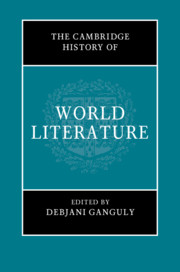Book contents
- The Cambridge History of World Literature
- The Cambridge History of World Literature
- Copyright page
- Contents
- Figures
- Contributors
- Acknowledgements
- Introduction
- Part I Genealogies
- Part II Thinking the World
- 9 Does Poetry Make Worlds?
- 10 Ecosystems of World Literature
- 11 From World Literature to World Philosophy and Back Again
- 12 Saving Europe through Weltliteratur: The Case of Victor Klemperer
- 13 Viśvasāhitya: Rabindranath Tagore’s Idea of World Literature
- Part III Transregional Worlding
- Part IV Cartographic Shifts
- Part V World Literature and Translation
- Part VI Poetics, Genre, Intermediality
- Part VII Scales, Polysystems, Canons
- Part VIII Modes of Reading and Circulation
- Part IX The Worldly and the Planetary
- Index
- References
11 - From World Literature to World Philosophy and Back Again
from Part II - Thinking the World
Published online by Cambridge University Press: 17 August 2021
- The Cambridge History of World Literature
- The Cambridge History of World Literature
- Copyright page
- Contents
- Figures
- Contributors
- Acknowledgements
- Introduction
- Part I Genealogies
- Part II Thinking the World
- 9 Does Poetry Make Worlds?
- 10 Ecosystems of World Literature
- 11 From World Literature to World Philosophy and Back Again
- 12 Saving Europe through Weltliteratur: The Case of Victor Klemperer
- 13 Viśvasāhitya: Rabindranath Tagore’s Idea of World Literature
- Part III Transregional Worlding
- Part IV Cartographic Shifts
- Part V World Literature and Translation
- Part VI Poetics, Genre, Intermediality
- Part VII Scales, Polysystems, Canons
- Part VIII Modes of Reading and Circulation
- Part IX The Worldly and the Planetary
- Index
- References
Summary
This essay claims that “world literature” should be understood as a genre rather than as a canon of circulating texts. In this sense, “world literature” denotes writing that is written for and to the world in general, rather than for or to any particular community or readership. Franz Kafka’s writings exemplify this understanding of world literature, which was mediated by a particular moment in the history of philosophy—the moment when philosophy too became “worlded.” This essay considers three interconnected events of intellectual and literary history to advance this argument: 1) when the category “world literature” first appeared in England among a group of mid-eighteenth century Anglican clergymen called the Warburtonians; 2) Schopenhauer’s re-assemblage of Asian and European thought to produce a profoundly influential philosophy of the world; and 3) Kafka’s writings which belong to the Schopenhauerean aftermath, and which can be understood as a mode of literature which neither emerges from any particular literary/rhetorical lineage or tradition nor is directed towards or written in the interests of any knowable community or readership, but rather to and of the world itself.
- Type
- Chapter
- Information
- The Cambridge History of World Literature , pp. 229 - 245Publisher: Cambridge University PressPrint publication year: 2021

